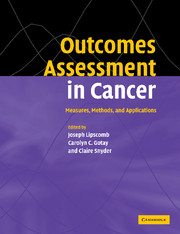Book contents
- Frontmatter
- Contents
- List of contributors
- Acknowledgments
- 1 Introduction to Outcomes Assessment in Cancer
- Health-related quality of life in cancer: general concepts and generic measures
- Assessing health-related quality of life during treatment
- Assessing health-related quality of life across the cancer continuum
- Measuring the experience and needs of cancer patients and caregivers
- Methodological considerations in applications to cancer outcomes research
- Modern psychometric theory in cancer outcomes research
- Assessing the economic impact of cancer
- Research and policy implications
- Invited papers
- Invited Paper A The world of outcomes research: yesterday, today, and tomorrow
- Invited Paper B The ten Ds of health outcomes measurement for the twenty-first century
- Invited Paper C The use of cognitive interviewing techniques in quality of life and patient-reported outcomes assessment
- Invited Paper D Industry perspective regarding outcomes research in oncology
- Index
- References
Invited Paper C The use of cognitive interviewing techniques in quality of life and patient-reported outcomes assessment
Published online by Cambridge University Press: 18 December 2009
- Frontmatter
- Contents
- List of contributors
- Acknowledgments
- 1 Introduction to Outcomes Assessment in Cancer
- Health-related quality of life in cancer: general concepts and generic measures
- Assessing health-related quality of life during treatment
- Assessing health-related quality of life across the cancer continuum
- Measuring the experience and needs of cancer patients and caregivers
- Methodological considerations in applications to cancer outcomes research
- Modern psychometric theory in cancer outcomes research
- Assessing the economic impact of cancer
- Research and policy implications
- Invited papers
- Invited Paper A The world of outcomes research: yesterday, today, and tomorrow
- Invited Paper B The ten Ds of health outcomes measurement for the twenty-first century
- Invited Paper C The use of cognitive interviewing techniques in quality of life and patient-reported outcomes assessment
- Invited Paper D Industry perspective regarding outcomes research in oncology
- Index
- References
Summary
As pointed out by multiple researchers, including several contributors to this volume, the designers of any health-related quality-of-life (HRQOL) questionnaire must consider the viewpoint of the individual who is asked to complete that instrument.– In particular, it is imperative that we understand the cognitive aspects of the response process — what the respondent understands the questions to be asking, his or her recall of relevant information (or failure to recall it), and other judgment and decision processes that influence the nature of the given answers that constitute our raw data. HRQOL instrument developers appear to vary widely in the extent to which they explicitly take into account respondent cognition, and several questionnaires have been either developed or evaluated through means that emphasize the respondent point of view or that empirically investigate key cognitive processes.,
However, the application of cognitive principles and techniques is inconsistent, often unsystematic, or not well documented. Ganz and Goodwin have suggested that instrument development is generally not a high priority in the peer-review process. The purpose of the current chapter is to suggest means for enhancing both practice and communication between researchers in this regard by: (a) advocating the explicit use of the cognitive interviewing method as a systematic means for studying cognition, and (b) describing the ways this technique can be used to inform several key design decisions that confront HRQOL questionnaire developers. This chapter is not intended to review extant quality-of-life instruments (see Chapter 3 by Erickson in this volume).
- Type
- Chapter
- Information
- Outcomes Assessment in CancerMeasures, Methods and Applications, pp. 610 - 622Publisher: Cambridge University PressPrint publication year: 2004
References
- 9
- Cited by



